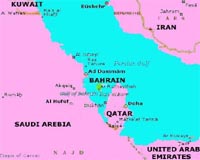| . |  |
. |
Cairo (UPI) Mar 22, 2011 The Syrian regime in Damascus, which President Bashar Assad recently claimed was "immune" from the political upheaval gripping the Arab world, is now grappling with street protests on a scale not seen for a generation. The trouble hasn't yet taken root in the heavily guarded capital of one of the Middle East's repressive states outside of the occasional skirmish. But the regime has cracked down harshly against unrest in the poverty-stricken southern city of Daraa in recent days in which troops fired on protesters, killing at least five and possibly as many as 25. Tens of thousands of protesters torched the offices of the ruling Baath party, the Palace of Justice and a cellphone company run by Assad's cousin, Rami Makhlouf. Damascus blamed unidentified hidden hands for "acts of sabotage." Despite the regime's notorious opacity, Assad is reported to have ordered the army's elite 4th Armored Division, commanded by his younger brother Maher, to Daraa, near the Jordanian border 60 miles south of Damascus, after three days of violence. The plan appears to be aimed at cutting off southern Syria from the rest of the country to isolate the unrest using troops whose loyalty to the regime is considered absolute. Syria has been ruled under emergency law since the Baath seized power in a 1963 coup and banned all political opposition. The military has also been ordered to blockade the nearby Jebel ad-Druze region, a mountainous region abutting the Israeli-occupied Golan Heights and home to 1 million Druze tribesmen. The minority Druze, a mystical offshoot of Islam, staged a great revolt in 1925-27 that spread across Syria when it was still under French mandate. The Assad regime is dominated by another Muslim minority, the Alawites, even though Syria is predominantly Sunni. Since the political turbulence engulfing the Arab world began in Tunisia in January, Syria had, until 10 days ago, appeared to be riding out the storm. Indeed, Assad was confident enough to boast to The Wall Street Journal that Syria's tightly controlled society was "immune" from the protest virus. He did allow though that political reform in Syria had barely moved forward since he took over from his father, Hafez Assad, who died in June 2000. Hafez Assad, a former air force commander, established the regime in a 1970 putsch, the last in a dizzying chain of Syrian coups and counter-coups that began in the post-World War II turbulence in 1949. Syria has a history of ruthlessly crushing dissent. In 1982, Hafez Assad provided a brutal object lesson to those who would defy him. When the Muslim Brotherhood tried to assassinate him, he unleashed his army on the city of Hama, razing whole districts and killing an estimated 30,000 people. Another worry for Damascus is Syria's restive Kurdish minority, which, like its cousins in Iran, Turkey and Iraq, have long dreamed of an independent homeland and have periodically stood up to the regime, at some considerable cost in lives. The last serious trouble with the Kurds was in 2004, when clashes broke out in the northern city of Qamishli. Security forces killed 25 protesters. The Kurds, with their warrior traditions, are arguably the most potent threat to Assad's regime. While the military and the ubiquitous and all-pervasive internal security apparatus established by Hafez Assad remain loyal to the regime, it is reasonably safe. But the support of the military should no longer be taken for granted in the Arab world any more -- not since the generals in Egypt and Tunisia abandoned those countries' rulers, forcing them to step down. Assad is unique in the modern Arab world because he took over when his father died a decade ago, the only son of a republican dictator to inherit power and establish a dynastic precedent. That hasn't sat well with many Arabs, even though he's seen as one of the few Arab leaders prepared to stand up to Israel. One of the reasons Egyptian President Hosni Mubarak was brought down by a popular uprising Feb. 11, ending his 30-year rule, was because his countrymen opposed his plans to hand over power to his son Gamal. A large part of the growing popular rage at President Ali Abdullah Saleh of Yemen stems from his efforts to be succeeded by his son Ahmed.
Share This Article With Planet Earth
Related Links Democracy in the 21st century at TerraDaily.com
 Iraqis rally for third day of Bahrain protests
Iraqis rally for third day of Bahrain protestsBasra, Iraq (AFP) March 19, 2011 Thousands of protesters in southern Iraq chanted slogans and carried effigies of Gulf rulers on Saturday in a third day of rallies supporting Shiite-led pro-democracy protests in Bahrain. About 7,000 protesters, many of them women, marched in the streets of the southern city of Basra to express their anger at a violent crackdown on the protesters by Bahrain's Sunni monarchy. "Gulf rulers ... read more |
|
| The content herein, unless otherwise known to be public domain, are Copyright 1995-2010 - SpaceDaily. AFP and UPI Wire Stories are copyright Agence France-Presse and United Press International. ESA Portal Reports are copyright European Space Agency. All NASA sourced material is public domain. Additional copyrights may apply in whole or part to other bona fide parties. Advertising does not imply endorsement,agreement or approval of any opinions, statements or information provided by SpaceDaily on any Web page published or hosted by SpaceDaily. Privacy Statement |